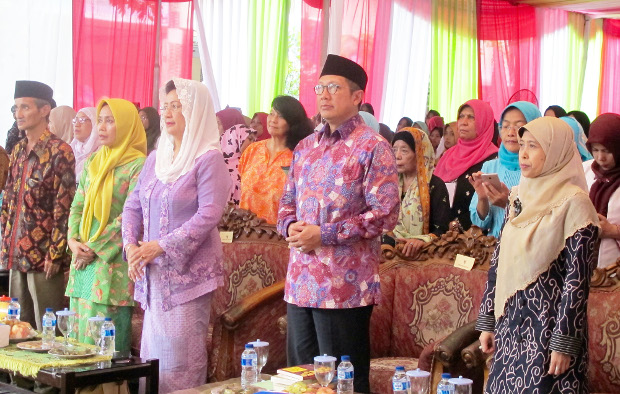Indonesian Muslim Women Leaders Speak Out on Marriage, Extremism, Rape
2017.05.02
Cirebon, Indonesia
 Students perform at the closing ceremony of the Congress of Indonesian Women Clerics in Cirebon, West Java, April 27, 2017.
Students perform at the closing ceremony of the Congress of Indonesian Women Clerics in Cirebon, West Java, April 27, 2017.
Women clerics should take a more active role on issues such as child marriage, polygamy and religious extremism, according to participants at a first-of-its-kind congress in Indonesia.
Demonstrating that principle, the two-day Congress of Indonesian Women Clerics (KUPI) called on the government of Muslim-majority Indonesia to raise the minimum marriage age for girls to 18 and declared that sexual violence is forbidden inside marriage as well as outside of it.
“It’s time for women clerics to come forward and discuss these issues and give strength to those working on the ground in all fields,” said Bushra Qadim Hyder, an activist from Pakistan whose organization, PAIMAN Alumni Trust Pakistan, is working to promote peaceful Islam.
Religious extremism is one of the most urgent issues for female clerics to address, since women are directly involved in raising children, Bushra told BenarNews on the sidelines of the conference in Cirebon, West Java, which drew more than 200 participants in late April.
“They should condemn extremism, and they should educate mothers to avoid extremism at home, and to support their children as tolerant Muslims and tolerant humans,” Bushra said.
Point of view
Some issues facing Muslim women arise from the relative lack of female perspective on Islam’s holy book, said Nur Rofiah Bil Uzm, a lecturer in the postgraduate program at the Al Quran College of Higher Education in Jakarta.
“There is a verse about monogamy in the Quran. Why is it not popular? Maybe because female clerics have not yet emerged,” she said during one of the congress’s sessions.
It’s not easy for women to become leaders because of cultural perceptions favoring men, supported by men’s interpretations of religious texts, said Machasin, a professor at Sunan Kalijaga State Islamic University in Yogyakarta.
“Men alone cannot make balanced religious interpretations because they bring only the male point of view,” he said.
Lack of access to education is another factor, according to Hatoon Al-Fasi, a Saudi historian who spoke at a seminar for international guests that kicked off the congress.
“It’s really important to establish our rights. We’ve been put aside and deprived of knowledge because some religious scholars called education as unislamic. That has deprived women of knowledge for a long time,” she told journalists on the sidelines of the seminar.
“We’ve all been affected by the controversial verses that are used to prove that women are inferior to men. These verses are interpreted by men and are haunting for women.”
Harmful
The congress ended with a series of recommendations on social issues, including that Indonesia raise the minimum marriage age for girls from 16 to 18.
“All parties must do everything they can to minimize this harmful practice,” Badriyah Fayumi, head of the KUPI steering committee, said of child marriage at the closing ceremony.
Government agencies should not register child marriages, and officials who support the practice by falsifying identity documents should face repercussions, she declared.
Religious Affairs Minister Lukman Saifuddin welcomed the recommendation.
“I will immediately communicate with the state minister for women’s empowerment and child protection, to conduct this review,” he said.
But he called for more concrete specifications on the subject, saying certain exceptional cases need to be considered. He did not elaborate further.
The female clerics also urged religious leaders to support victims of sexual violence, not allowing them to be stigmatized, cast out of society or forced to marry the perpetrator.
“From an Islamic point of view, the state has the obligation to guarantee citizens’ rights, especially victims’ rights,” said Priyati, a congress participant from Jakarta who read out the declaration against sexual violence.
“Sexual violence in all its forms is haram whether in marriage or outside of marriage, because it violates human rights guaranteed by Islam,” the declaration said.
Moderation
Lukman, the religious affairs minister, praised the congress.
“This congress has succeeded in affirming and emphasizing that Islamic moderation should always be our priority. Moderate Islam, Islam which is rahmatan lil alamin, Islam that does not marginalize women,” he said, using an Arabic phrase that means “a blessing for the world.”
Masrivah Amva, owner of Pesantren Kebon Jambu al-Islamy,the boarding school where the Congress was held, said she was very satisfied with its results.
“Our hard work has borne fruit beyond our hopes, and our aspirations have been heard,” she told BenarNews.
Masrivah said organizers, including the Syekh Nurjati State Islamic Institute of Cirebon and the Asian Muslim Action Network (AMAN) Indonesia, initially encountered resistance as the gathering was seen as unfriendly to men or aiming to change the role of male clerics.
“The Congress was very friendly and open to anyone, even foreign observers,” she said.

Senator and Yogyakarta queen GKR Hemas (third from right), Religious Affairs Minister Lukman Saifuddin (second from right) and Muslim cleric Nyai Haji Badriyah Fayumi (right) stand during the closing ceremony of the congress in Cirebon, West Java, April 27, 2017. [Ismira Lutfia Tisnadibrata/BenarNews]







